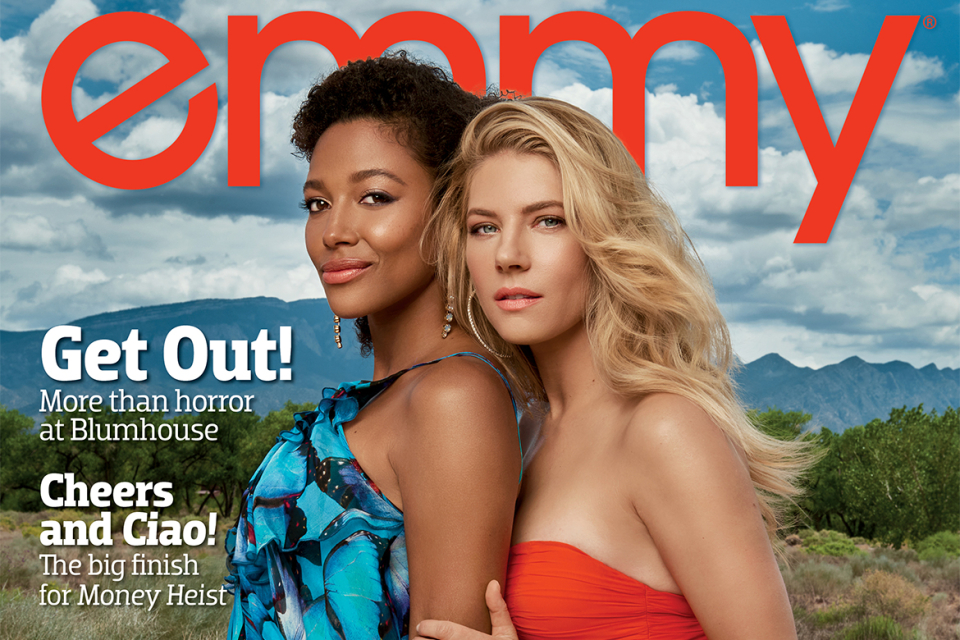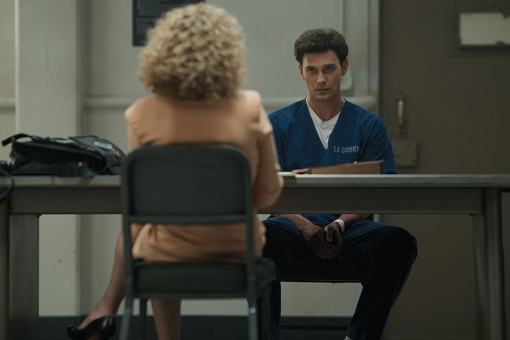Katheryn Winnick wanted a black eye.
In her first meeting about joining the cast of ABC's Big Sky, Winnick told creator–executive producer David E. Kelley that when her character, Jenny Hoyt, got into a bar brawl, she wanted there to be visible damage. Winnick expected some resistance. She'd spent six seasons playing the warrior queen Lagertha on History Channel's Vikings, in which she was often accessorized with blood and battle gore.
But in her experience, broadcast networks preferred to keep actresses "pretty and glossy." Case in point: when Winnick guest-starred in a 2007 episode of Fox's House, even though her character was in a hospital, recovering from both rape and a suicide attempt, she still had to wear lipstick.
"I had a hard time with that," the actress says. Big Sky, she hoped, would be different. Whenever the private-detective characters got involved in chases or fights, surely there would be cuts and bruises... wouldn't there? "It's the reality of a fight," Winnick says. "Why wouldn't you have a black eye or a busted lip?"
Happily for Winnick, a conventional network series wasn't what Kelley had in mind. The prolific writer-producer — most recently responsible for the Nicole Kidman trilogy of Nine Perfect Strangers (for Hulu) and The Undoing and Big Little Lies (both for HBO) — originally conceived the Big Sky project as a cable series.
But when he encountered delays at EPIX, his producers and agents sent the script to Karey Burke, who was ABC's entertainment president at the time and had worked with Kelley on L.A. Law when she was at NBC. In November 2019, Burke and Kelley had a meeting in his office. Executive producer Ross Fineman was there, too, and he remembers this exchange:
Kelley: "This is a cable show. This is a streaming show. I don't think it's a network show."
Burke: "Neither do I. That's why we want it."
Kelley: "I don't want to do a network show. I want to do something that's elevated."
Burke: "So do we."
Kelley: "I'm not as interested in the procedural portion of it. I want to tell character stories."
Burke: "So do we."
Kelley: "It's only like five books. I can't make one book last 22 episodes."
Burke: "Can you do two or three books a season? Let's do that."
"It was pretty awesome," Fineman recalls. "She didn't even wait for a yes or no. The meeting was over, and we walked out with a series commitment."
The five books being discussed were bestsellers by novelist C.J. Box: Back of Beyond, The Highway, Badlands, Paradise Valley and The Bitterroots. The series initially focuses on rogue Montana detective Cody Hoyt, who doesn't last long with any partner. But Cody is abruptly killed halfway through the second book — a crafty surprise that passes the baton to rookie Cassie Dewell to take over the investigation and the series.
For the TV adaptation, Kelley moved Cody's murder up to the end of the premiere episode, signaling, he says, that "Big Sky is the kind of show where the unexpected happens and no one is safe." It was a move straight out of the Game of Thrones playbook: kill off the biggest name actor — in this case, Ryan Phillippe — leave all the other characters scrambling, and watch the ratings climb.
When Kelley stepped back to more of a supervisory role for the second half of the first season, he told new showrunner Elwood Reid — whom he describes as a "really rugged writer who knows the world of Montana" — not to be shy, but to "kill off whoever you want." Says Reid, "That was his attitude, and it was kind of liberating."
Big Sky continues to demonstrate that it's not playing by the usual broadcast rules. Following Burke's suggestion, the story unfolds more like a limited series, the first season burning through two of the books: The Highway, which introduced Ronald Pergman (Brian Geraghty), a.k.a. the Lizard King, a serial killer and sex trafficker, and The Bitterroots, which focused on the violent and self-destructive Kleinsasser family.
These compact serialized arcs, requiring only short production commitments, made it easier to attract top talent.
Actor Ted Levine, for instance, who has to dedicate some of his spare time to a restaurant he owns in Escalante, Utah, needed a little coaxing to come to Vancouver to play the short-lived Kleinsasser patriarch. "I told him, 'I'll let you ride a horse. I'll give you a good scene partner. And I'll kill you off,'" Reid says. "My pitch basically is, 'Come play with us on Big Sky, do really cool stuff, and we'll find a way to get you off the show.'"
Or bring you back, as is the case with John Carroll Lynch, whose duplicitous Montana state trooper Rick Legarski died mid-season. Lynch will be back, but how? It's too soon to say, but dream sequences, flashbacks or the identical twin teased in the finale all seem plausible.
"We keep our regulars," Fineman notes. "But we keep introducing new stories, new characters. It's characters first."
"This series is first and foremost about Cassie and Jenny," Kelley says.
Imagine a pair of on-screen detectives who are unlikely partners.
Chances are, you think of a more reserved guy paired with a wild card, as in Starsky & Hutch. Maybe one is Black, or female, or both. Big Sky is one of the rare detective shows to feature two women as partners. It's not the first to do this (consider CBS's Cagney & Lacey, TNT's Rizzoli & Isles or ITV's Scott & Bailey). But Big Sky is a little more complex — and a lot quirkier — than its predecessors or even its source material.
And it's all due to Kelley. Much of the show's narrative architecture is derived from Box's books, but Kelley's greatest trick in this adaptation was remixing its characters. Take, for example, Jenny Hoyt. Kelley's idea was to take Cody's detective partner, Cassie Dewell (Kylie Bunbury), and divide her book personality into two show characters: one of them Cassie herself, and the other Cody's widow, Jenny, a very minor presence in the books.
Now Jenny is a detective in her own right, an ex-cop who still has connections to law enforcement resources (as Cassie does in the books). Compared to Cassie, who is cautious and thoughtful, Jenny is impulsive and possibly unhinged.
"We couldn't be more polar opposites," Winnick says. There's a tension between Cassie and Jenny that derives from a thwarted love triangle with Cody. Now, with Cody gone, Kelley felt the two women's ongoing relationship needed fleshing out. "We wanted to give some currency to that relationship that lived beyond Cody's departure," he says.
So the actors reshot a scene in the pilot to emphasize that Cassie and Jenny had been friends first. "Another thing we added," Winnick says, "is seeing Cassie dancing and having fun. A woman who breaks up a marriage could be seen as a villain. But showing how lovable she can be, you understand that maybe she didn't know the full story."
At a writers' meeting this summer, Winnick proposed that Jenny's backstory be explored to find ways to make her even more distinct from Cassie.
And so season two, which begins on September 30, dives into how those two women diverge, especially following Jenny's near-death experience after being shot. (Winnick hoped to represent her character's mindset by chopping off her long locks; so far, that's been vetoed.) Meanwhile, Cassie has to accept that bringing Ronald Pergman to justice is more complicated than she imagined.
There might be a little romance coming either Jenny's or Cassie's way, too — possibly in the form of U.S. Marshal Mark Lindor (Omar Metwally), who's returning to the show. And if not him, there'll also be a mysterious new character named Travis (Logan Marshall-Green) surfacing from Jenny's law-enforcement past working undercover.
"I'm hoping to peel back some layers and learn who these characters are," Reid says, "so that when we get them in these crazy situations, your heart is pounding, and you're saying, 'Please don't kill this character that we spent all this time getting to know!'" Cody died before viewers had gotten to know him — they had simply assumed he was here to stay. Now, Reid says, the writers want to pull off similarly startling developments in other ways. "That's what we talk about every day in the writers' room," he says. "'You like these characters? I'm going to make you like them even more, and then I'm going to torture them." ...
For the rest of the story, pick up a copy of emmy magazine HERE
This article originally appeared in its entirety in emmy magazine, Issue No. 10, 2021
For a peek behind the scenes of our cover shoot, click HERE
For more on the setting of Big Sky, click HERE; Read our exclusive interviews with Dedee Pfeiffer and Jesse James Keitel.











